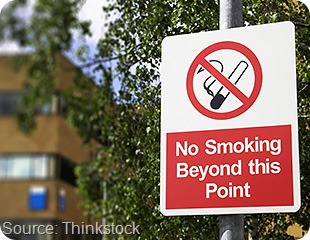The introduction of laws banning smoking in public places and workplaces in North America and Europe has had a positive impact on child health.

The first systematic review and meta-analysis examining the effect of smoke-free legislation on child health, recently published in The Lancet, shows that smoking bans were quickly followed by large drops in pre-term births and the number of children attending hospital for asthma.
The analysis included 11 studies conducted between 1975 and 2013 in North America and Europe in children aged 12 years or younger. The studies were identified through a systematic search of both published and unpublished studies and covered more than 2.5 million births, and nearly 250 000 asthma exacerbations.
Results showed that rates of both pre-term births and hospital attendance for asthma were reduced by 10% within a year of smoke-free laws coming into effect.
Dr Jasper Been from the Maastricht University Medical Centre, The Netherlands, explained “Our research found significant reductions in pre-term birth and severe asthma attacks in childhood, as well as a 5% decline in children being born very small for gestational age after the introduction of smoke-free laws...Together with the known health benefits in adults, our study provides clear evidence that smoking bans have considerable public health benefits for peri-natal and child health, and provides strong support for WHO recommendations to create smoke-free public environments on a national level.”
Sara Kalkhoran and Stanton Glantz from the University of California San Francisco, USA, commented that “Medical expenses for asthma exceeded US$50 billion in the USA in 2007, and US$20 billion in Europe in 2006. If asthma emergency department visits and admissions to hospital decreased by even 10%, the savings in the USA and Europe together would be US$7 billion annually.”
They conclude “... the rapid economic benefits that smoke-free laws and other tobacco control policies bring in terms of reduced medical costs are real. Rarely can such a simple intervention improve health and reduce medical costs so swiftly and substantially.”
Co-author Professor Aziz Sheikh, of Brigham and Women’s Hospital, USA, and the University of Edinburgh, UK emphasised “This research has demonstrated the very considerable potential that smoke-free legislation offers to reduce preterm births and childhood asthma attacks...The many countries that are yet to enforce smoke-free legislation should in the light of these findings reconsider their positions on this important health policy question.”
Source:
Been JV, et al. Effect of smoke-free legislation on perinatal and child health: a systematic review and meta-analysis. Lancet 2014. Published online 28 March 2014. Available at
http://www.thelancet.com/journals/lancet/article/PIIS0140-6736(14)60082-9/abstract